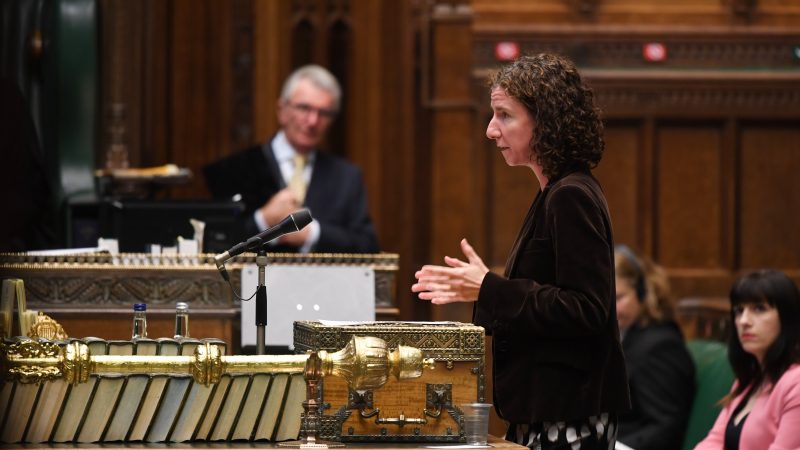
Anneliese Dodds has criticised the government for “always running to keep up” after the Chancellor used his third economic update in a month to unveil more financial support for businesses in the second coronavirus wave.
Rishi Sunak told the House of Commons this morning that the government would be offering a new grant scheme for businesses under Tier 2 restrictions. The distribution of the grants will be decided by local authorities.
The Tier 2 grants will be equal to 70% of the support currently available to businesses in Tier 3 areas, the Chancellor said. They will also be retrospective, with businesses able to backdate grants to August.
The retrospective aspect will be widely seen as a victory for mayors including Andy Burnham, who have complained that areas in the North of England and Midlands have been under Tier 2 for months without extra support.
Sunak told MPs that enough funding will be provided for every business premise in the hospitality, leisure and accommodation to be given a direct grant worth up to £2,100 for every month under Tier 2 rules.
The second measure unveiled by the Chancellor today consisted of significant changes to the job support scheme announced in September. The employer contribution towards hours not worked will change from 33% to just 5%.
The minimum hours worked requirement for eligibility will change from a third of normal hours to a fifth of normal hours – but workers who go down to a fifth of their hours will only receive just over 73% of their salary.
The scheme was originally criticised by Labour and the Resolution Foundation for failing to incentivise short-hours working, as it was made less attractive to employ more employees part-time than fewer full-time employees.
Sunak also announced that the grants available to Covid-affected self-employed workers would double from 20% of average monthly profits (up to a total of £1,875) to 40%, with the maximum grant increasing to £3,750.
The Association of Independent Professionals and the Self-Employed (IPSE) has welcomed the increase but said there are “deep structural problems” with the system remain as a third of self-employed people are excluded entirely.
Although the Chancellor said making further revisions to his winter economic plan so soon showed that the government was “acting fast as the moment demands and as the health situation evolves”, Labour disagreed.
Shadow Chancellor Anneliese Dodds compared the situation to a “long-running TV show” with “winter economic plan series three”, and said: “We’ve got to get ahead of this crisis instead of always running to keep up.”
Responding to the update, she reiterated the concerns of metro mayors by asking: “What’s changed that means this is the right thing to do now, but wasn’t when many parts of North and Midlands entered Tier 2 months ago?”
Dodds also asked again about the formula for local support that the government claims to have adopted but has never published, and reiterated the call made by Keir Starmer for a national circuit breaker over half-term.
The TUC’s Frances O’Grady described the new measures as a “step forward” but said “there are still big holes” as low-paid workers “have to get by on less than 80% of their wages” and “support for the self-employed is still too low”.
Unite said the measures “ought to have come weeks ago”, stressed the need for “a minimum commitment of 80% wage support” and warned of “certain hardship for a great many people” without this move.
Usdaw expressed disappointment that the Chancellor “made no mention of retail”. The union also called for 80% wage support and statutory sick pay levels that reflect average earnings for the low-paid.
General union GMB welcomed that Sunak was “removing excuses for employers not to retain their workforces” but added that the measures would “still leave many struggling to feed their families as winter sets in”.
Labour MP Richard Burgon raised the idea a “wage floor” that would ensure no furloughed worker lives on less than the minimum wage. Currently they will be on “just £5.81 per hour – the minimum wage level of 11 years ago”.




More from LabourList
‘Labour council candidates – it’s tough, but all is not lost’
‘Labour won’t stop the far right by changing leaders — only by proving what the left can deliver’
‘Cutting Welsh university funding would be economic vandalism, not reform’